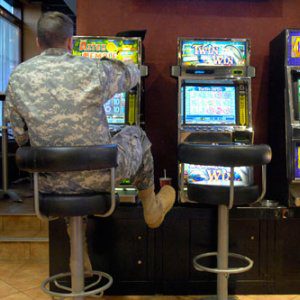Even the most courageous men and women who serve our country are prone to losing a battle with substance use disorder, problematic gambling, or post-traumatic stress disorder (PTSD). Many people are unaware of what military veterans go through on a daily basis once returning home after duty.
Numbers don’t lie:
There are more than a couple of studies that reveal how much more common problem gambling is among military members (active or vets) than it is among civilians.
- One study in 2013 took 1,999 veterans that were randomly selected from Veteran Affairs (VA) centers and community clinics in Albuquerque and Minneapolis. The study was put in place to understand the prevalence rate of problematic gambling that affects veterans who receive VA care. The study concluded that military vets in VA care have higher rates of gambling problems than the general adult population. 2% of military vets showed problem gambling was prevalent while the general population was at 1%. Other, more recent studies suggest that military vet gambling has risen since 2013.
- A separate study concluded that approximately 17% of veterans being treated for PTSD showed symptoms of problem gambling.
- Veterans with disordered gambling often also deal with serious co-occurring conditions, such as substance use or clinical depression. This is very scary because military vets that turn to gambling or drugs to relieve their stress generally create more anxiety for themselves that include debt, loss of possessions, divorce and even suicide.
- About 40% of veterans in treatment for problem gambling reported making suicide attempts.
Combatting addiction is not easy, but civilians and war heroes alike should fight to treat their gambling problems by seeking professional help. From fantasy sports to illegal sports betting in AC and beyond, we strive to help our veterans resist the urges that come with gambling addictions on a daily basis. We offer a 24/7 hotline (1-800-GAMBLER) that connects people with resources, industry professionals and fellow problem gamblers in recovery.
November 11th, 1918 is considered the end of World War I (or The Great War at the time), and November 2016 can be the time where you put an end to your war against yourself. For more information on quitting gambling, visit https://800gambler.org. According to Neva Pryor, whether you are illegally betting for big money during sports games in Atlantic City or gambling at the casinos, the CCGNJ has experts that know how to lead you in the right direction.



